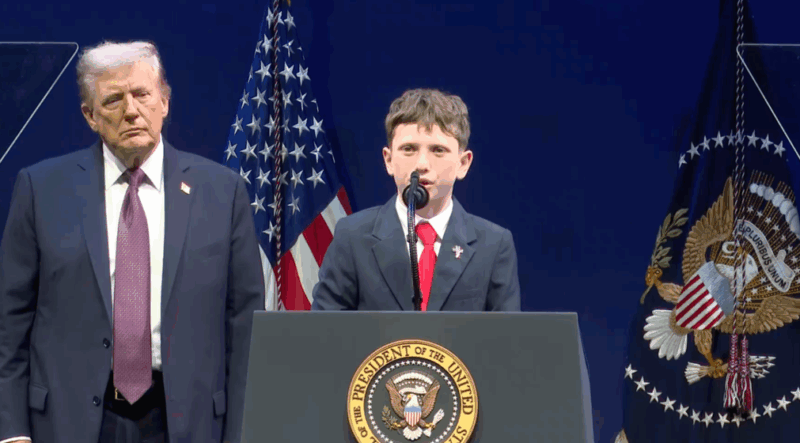President Trump Discusses Prayer In Public Schools
President Donald Trump took a bold step today in reaffirming one of America’s most foundational freedoms: the right to pray, believe, and live one’s faith openly—especially in public schools. Standing at the podium, Trump didn’t just speak about policy—he made the moment personal. With him stood 12-year-old Shay from California, a young boy whose story illustrated the very heart of this debate.
Shay, calm but convicted, recounted how he was forced to read a book to a kindergarten student that directly contradicted his Christian beliefs. “I’ve been a Christian my whole life,” he said, “and Jesus means everything to me… I believe kids like me should be able to live our faith at school without being forced to go against what we believe.”
.@POTUS welcomes to the podium 12-year-old Shay from California, who was forced to read a book to a kindergarten student promoting a message of radical gender ideology that is contrary to his religious beliefs:
“I’ve been a Christian my whole life and Jesus means everything to… pic.twitter.com/KAtQL8CsOD
— Rapid Response 47 (@RapidResponse47) September 8, 2025
It was a moment that transcended talking points. In Shay’s words, the nation saw what’s at stake: the ability of children to carry their values into the classroom without fear of retribution or coercion. And it made Trump’s statement even more pointed: “To have a great nation, you have to have religion.”
This isn’t new territory for the Trump administration. Back in July, the Office of Personnel Management (OPM) issued a sweeping memo reaffirming religious rights in the federal workplace. The memo didn’t merely defend the status quo—it elevated the importance of religious expression, asserting that it deserves favored treatment under Title VII of the Civil Rights Act. The law, the memo stressed, doesn’t require neutrality—it demands accommodation. Religious speech and symbols, from icons on a desk to group prayer during break time, are to be protected—not punished.
Opponents are crying foul, of course. Groups like the Freedom From Religion Foundation (FFRF) have denounced both the workplace protections and the school prayer initiative, branding them “Christian nationalism” and political theater. Rachel Laser, president of Americans United for the Separation of Church and State, went so far as to say it’s “a lie that America is a Christian nation.”
But here’s the twist: in their rush to warn of “theocracy,” these groups consistently ignore the real stories—stories like Shay’s. A 12-year-old boy asked to violate his conscience to satisfy someone else’s idea of inclusivity. There’s nothing theoretical about that. And if that’s not coercion, what is?
Opponents of school prayer claim to defend freedom from religion, but Trump’s initiative is about the freedom for religion—the freedom to believe, to speak, and to live by those beliefs, without being pushed to the margins. It’s not about forcing religion on others; it’s about preventing the government or any institution from silencing it entirely.
Religious liberty isn’t a privilege—it’s a right. And if young people like Shay can be silenced at school, it signals a troubling erosion of that right. The administration’s push is a reminder that our rights are not granted by bureaucrats, but by something far higher—and they are not to be bartered away for political convenience.


